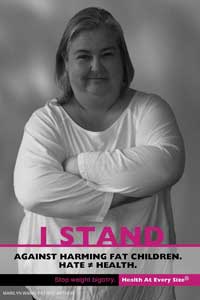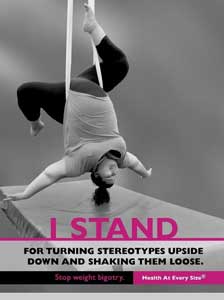 Marilyn Wann has worked as a fat activist full time since the mid-90s, dedicating her time to fighting weight discrimination. She’s the author of the book FAT!SO? and also publishes a ‘zine by the name, and regularly gives talks on the subject. When she first saw Georgia’s Strong4Life anti-obesity ads, she “felt angry, sad, and afraid for the health and happiness of children of all sizes and their families.”
Marilyn Wann has worked as a fat activist full time since the mid-90s, dedicating her time to fighting weight discrimination. She’s the author of the book FAT!SO? and also publishes a ‘zine by the name, and regularly gives talks on the subject. When she first saw Georgia’s Strong4Life anti-obesity ads, she “felt angry, sad, and afraid for the health and happiness of children of all sizes and their families.”
Wann channeled these feelings into a new project, re-creating the ads to send positive messages about all body types. “I was very angry when I saw one particular image used in the Georgia hate campaign,” Wann explained to me in an email. “It shows a fat girl (an actor!) in a striped shirt, with this slogan over her belly: ‘It’s hard to be a little girl when you’re not.’ This is not a health message, it’s a hate message. I decided to put a photo of me in the place of that girl, with a slogan that tells children of all sizes I’ll stand up to their bullies, even if it’s a big hospital system (or the first lady) who does it. My credo: ‘I stand against harming fat children. Hate ≠ health.’ I want to show the world that it’s not okay to shame fat children or to give them dangerous, discriminatory health advice. I posted my ‘I STAND…’ photo to my Facebook profile and offered to make similar photos for anyone who wanted to join me.”
Many people have joined. Their images of people with all shapes and sizes, along with their personal messages of acceptance not only criticizes the mainstream conception of beauty, but also embrace an alternative. (See more of the “I STAND…” images here.)
The project grew faster than Wann anticipated. “There has been a huge response from people of all sizes and ages and genders who are eager to stand up to the bullies,” says Wann. “I’m especially inspired by the children who have demanded to be included! There are more than 400 “I STAND…” photos and more are still coming in every day. After the first two days, it was impossible for me to respond to the requests myself. I have relied on a team of more than a dozen fabulous volunteers, whom I call the Photo Heroes. Another fat activist, Ragen Chastain, started a project to raise money to buy outdoor advertising in Atlanta to oppose the hate campaign there. Her ads will ask people to help end weight prejudice and promote a Health At Every Size approach. Within 24 hours, the weight diversity community donated more than $20,000, which will allow Ragen to buy a lot of billboard and bus shelter advertising.”
 Wann explains that she supports the Health At Every Size campaign, and rejects the idea that simply losing weight will lead to better health. “Given the near-total failure rate of weight-loss dieting, the high chance it will do people physical or psychological harm, and the certainty that weight-loss dieting reinforces and promotes weight prejudice, I encourage all human beings to avoid weight-loss goals and weight-loss dieting. We can all love our bodies and take good care of our health with pleasurable eating and joyful exercise. I recommend the Health At Every Size approach.”
Wann explains that she supports the Health At Every Size campaign, and rejects the idea that simply losing weight will lead to better health. “Given the near-total failure rate of weight-loss dieting, the high chance it will do people physical or psychological harm, and the certainty that weight-loss dieting reinforces and promotes weight prejudice, I encourage all human beings to avoid weight-loss goals and weight-loss dieting. We can all love our bodies and take good care of our health with pleasurable eating and joyful exercise. I recommend the Health At Every Size approach.”
This is particularly true of for children says Wann. “All of the anti-‘obesity’ messages that currently target children (Yes, even Michelle Obama’s!) are harmful and counterproductive,” she says. “Children who pursue weight-loss goals may well end up weighing more. In all of the places where there have been programs to make fat children lose weight—from Arkansas to Singapore—there has been no significant weight loss or health benefit. It is not tough love to shame fat children; it is not for their own good…it’s just bullying.”
She adds that weight discrimination may even lead to unhealthy habits in thinner children. “If thinner children view healthy eating and activity as punishment for being fat, they’ll think it’s okay to eat poorly and be sedentary because they’ll think being thin makes them invincible. Good nutrition and fitness habits provide health benefits to all children, even without weight loss.”
Wann argues that children should not be taught that their fat bodies are bad, and that the focus on weight loss for children is out of touch with their realities. “Obviously, telling fat children that it’s bad to be fat makes them feel bad about themselves! Fat children can see around them that thin people are privileged and fat people are disadvantaged (in employment, education, housing, accommodations, health care, and social interactions). Fat children will learn that they are not equally valued, as people. The right answer is not to change fat people; the answer is to change the anti-fat prejudice.”
Also Read:
Ashamed Twitter Chat Puts Pressure on Georgia’s Strong4Life Childhood Obesity Campaign
